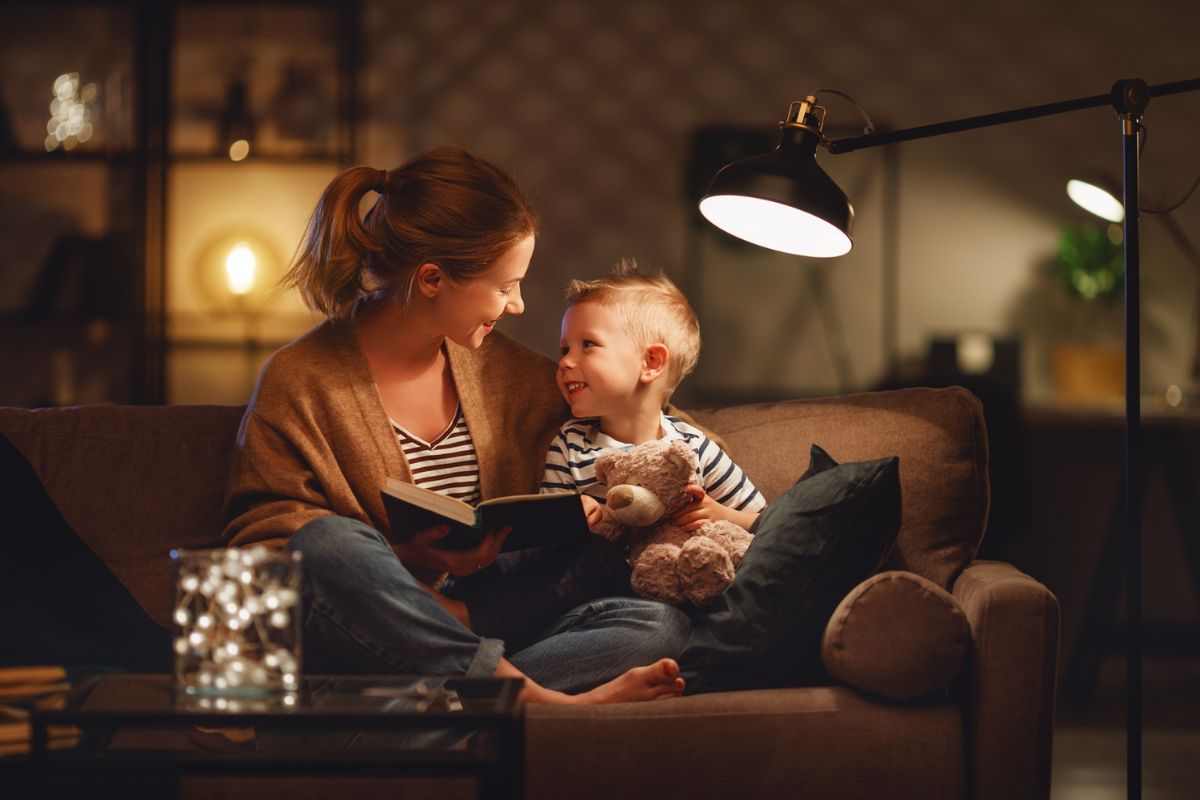Tips On Working From Home With Kids With Nathan Wallis
Nathan Wallis Q&A: Your parenting questions during lockdown
How do you juggle looking after young children while working from home?
Don’t worry too much about academic output. Instead focus on open-ended activities they can do independently. Make sure you create a routine where your child knows they’ll have your undivided attention for a set time each day.
Under the age of seven, the most important thing is to have your child enjoy learning - so they start to feel confident as a learner. A child needs to be challenged, but if they experience too much failure, they’ll start to disengage.
Focus more on having fun than pushing the reading and maths. It’s important to give children open-ended activities that they can do alone - like playdough, painting, story making, or other imaginative activities.
While we’re in lockdown, make sure you’re getting outside with your children when you can. Even just to take a walk around the block - to get rid of some of that pent-up energy.
For parents working from home, it’s also really important to have clear times when you’re with your child and when you’re doing work – and communicate that with them. If children have a routine and predictable times when they know they’ll have your undivided attention, it’s good for them and it’s good for you. Instead of saying no all the time, you’re able to say “yes, we can do that at 3:00pm” (or at whatever time you have set aside).
Is it best to replicate a school routine for my children while in lockdown?
Routines provide a source of stability during uncertainty. Whether it follows the school day or not, take your child’s lead and help establish a routine tailored to their personality and needs.
There’s no ‘one size fits all’ in this case. Some children will want to set up a school at home and run their day like they’re in the classroom. If a child initiates this sort of routine, then let them have it.
If your child is more neutral, it’s still good to have a routine, but this doesn’t necessarily need to mimic school – you can establish one that works for you. The reason routines are successful is because they’re predictable.
For parents of children with special needs, routine is even more important. Predictability helps to calm the stress response system, so the more routine they have in their day, the better their outcomes will be.
Should I be concerned my kids are spending more time than usual on their devices while in lockdown?
Don’t feel guilty about relying on devices a bit more in the short-term, but put measures in place to limit screen time, such as a daily two-hour session without any devices.
Minimising device use right now is tough, especially when you’re all restricted to the confines of your house (or neighbourhood).
And while it’s hard to say what the impact of a short-term increase might be – the literature does show a clear correlation between the amount of screen time and the chances of a child developing anxiety and depression later on.
Parents shouldn’t feel guilty about leaning on devices a little more than usual right now - but there should be some proactive measures put in place to try and limit that screen time, like having set “no device” times.
Even for kids who are otherwise on and off their devices all day, a full two-hour “device-free” window means they’re more likely to sit outside of that at-risk group. It’s likely you’ll experience resistance at the start, but if you persevere, they’ll get used to it and become more resilient as a result.
For children under the age of two, while their vision is still developing, they need face-to-face, real interactions more than anything else.
How do I deal with a child who’s becoming increasingly attached?
The more available you are to your child, the more resilient they will become.
It’s normal for children to become more attached to their parents or loved ones through times of uncertainty.
The research actually suggests that children who feel well supported, learn to become more resilient as they grow up. So what’s important here, is that you’re there for them - even if that just means giving them a hug when they need it.
How should I explain the virus to my kids in a way that is informative, without making them worried?
Watch how you react in front of children and make sure to model resilience. Acknowledge your child’s emotions, and always follow through with a positive action they can take to address the situation.
Start with addressing their feelings and emotions by saying something like, “yes, it is a bit strange that we have to line up far away from other people to go to the supermarket. It does feel a bit scary doesn’t it?”. This helps to acknowledge what they’re feeling is normal.
Then, model resilience by giving them positive action to take – such as reminding them to wash their hands.
A child’s response will be largely based on what they observe you doing, so be mindful of how you’re reacting to the situation - remember, children do as you do, not as you say.
How do I explain to younger children they can’t visit family or friends for at least a few weeks?
Reinforce positive messages. Set in place routine video calls with grandparents or virtual playdates with friends, while you manage screen time limits.
Reiterate that lockdown measures will ensure everyone stays safe and healthy, and outline what you (and they) can do to help.
While screen time should be limited, using devices to interact with friends and family during lockdown will be crucial in getting through this period. Try implementing a ritualised video call so it’s more than just getting on the phone and having a chat.
Set up morning tea with the grandparents, or nightly story-time if you have a parent in another household. Let them connect with friends by setting up virtual playdates. Stick to a regular plan so the child still feels they’re in constant connection with those important people outside of your bubble. This can be especially important if there’s only one child in the house.
How do I deal with older children who disobey the law to see their friends or girl/boyfriend?
Show empathy and validate teenagers’ feelings. Talking about laws and risks probably won’t make the difference, so try appealing to their emotions, such as reinforcing that this is a chance to strengthen their relationship.
Teenagers are notorious for challenging authority. They’re at an age where they’re biologically programmed to relate less to their parents and more to their peers.
It’s difficult during something like a lockdown but showing empathy is key. Relate to their emotions - “I know this is really hard, it does suck” – not too dissimilar from a two-year-old.
Teenagers find it harder to regulate their emotions. During adolescence, their frontal cortex (thinking brain) temporarily shuts down for renovations and their emotional brain gets a turbo boost. This is why it’s also harder for them to stay away from their social circle – especially if they’re in love or in a relationship.
They’re unlikely to be persuaded if you talk to them about regulations and consequences, so try and play up the romance of it which will appeal to their emotions. For example, “this will challenge you, but if you really love each other, you’ll come out the other side”.
From a neuroscience perspective, while they’re at completely different developmental stages, the brain of a two-year-old and 16-year-old are rather similar. So, follow a similar pattern - acknowledge the emotion, calm the emotion, and give them a strategy to work with. At this age, you should also be outlining the consequences of their actions.
What advice do you have for parents and their wellbeing in this time?
Set aside time and prioritise making self-care happen, so you can role model a positive response for your child.
It’s important to pause and take stock of your own wellbeing to ensure you’re not getting overwhelmed by what’s going on. Implement rituals that are just for you - whether that’s by taking a bath or a walk by yourself, to unwind and recharge.
You are the emotional barometer for your children – and you can’t pour from an empty cup, so prioritise taking time out to look after yourself.

What do you do about a child who’s become anxious at night?
Catering to your child’s needs will help them build resilience - even if that means staying with your child until they fall asleep. If need be, find a compromise but make sure your child knows you’re there if they need you.
Your focus should be on making them feel safe - especially during times of difficulty. And if that means lying with your child and staying with them until they fall asleep, that’s ok.
If need be, find a compromise. Agree that you’ll lie with them for ten minutes, then leave the door open or put a night light on. That way, you’ll be able to step back, but do so knowing your child feels safe and that you’re there for them when they need it.
The research shows that you can’t overindulge in times of trauma – and supporting your child now will give them the tools to deal with uncertainty on their own in the future and make them more resilient.
About Nathan Wallis:
Nathan Wallis is a Neuroscience Educator, nib health insurance parenting expert and regular media commentator. He hosts sold-out learning events for parents up and down the country (and abroad), talking to different stages of child development – including the first 1000 days - and how parents can be supporting their children in order to achieve the best possible outcomes.

About nib Health Insurance:
nib Health Insurance provides cover for even the littlest Kiwis. Having cover in place early, before any conditions are developed, means kids will be covered for grommets, adenoids and tonsil removal if the need arises.
If something more serious were to happen, nib’s cover is designed to help you skip the waiting lists in the public healthcare system and get private specialist and hospital treatment for your child, faster.
Private Hospital cover starts from under $4 per week for children under 20, and from under $15 per week for adults*. Cover is available online, with no medical questions asked. Click here to compare cover options for your family and get a quote. *prices based on one child under 21 and one 31 year old female non-smoker, both on a standard private hospital cover with a $500 annual excess and a 4% direct debt discount applied.
Want to see the Nathan Wallis Parenting Resilience Video?
Nathan Wallis, nib health insurance parenting expert, ran a live Facebook Q&A event responding to some of your most common questions on child resilience during the COVID-19 pandemic. You can also watch the full Q&A session on the nib health insurance Facebook page.
Want to know more?
